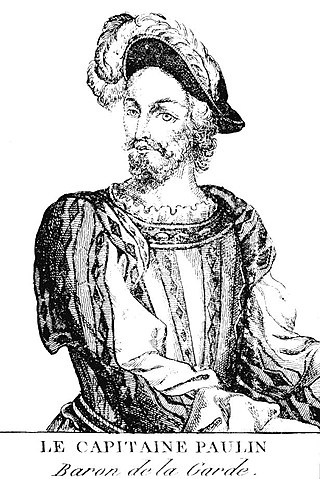Seibel grapes are a group of wine grape varieties which originated with the work of Albert Seibel crossing European grape with American grape species to increase disease resistance. They were planted widely in France during the 1950s but have seen decline in recent years because French wine law prohibits hybrid grapes in appellation wine. The grapes are still commonly used as blending grapes in table wine and mass commercial wines. New Zealand, England, and Canada also have plantings of Seibel grapes.
The Encyclopédistes were members of the Société des gens de lettres, a French writers' society, who contributed to the development of the Encyclopédie from June 1751 to December 1765 under the editors Denis Diderot and Jean le Rond d'Alembert.
The Lymond Chronicles is a series of six historical novels written by Dorothy Dunnett and first published between 1961 and 1975. Set in mid-16th-century Europe and the Mediterranean area, the series tells the story of a young Scottish nobleman, Francis Crawford of Lymond, from 1547 until 1558.

The Italian War of 1551–1559, sometimes known as the Habsburg–Valois War and the Last Italian War, began in 1551 when Henry II of France declared war against Holy Roman Emperor Charles V with the intent of recapturing parts of Italy and ensuring French, rather than Habsburg, domination of European affairs. The war ended following the signing of the Treaty of Cateau-Cambrésis between the monarchs of Spain, England and France in 1559. Historians have emphasized the importance of gunpowder technology, new styles of fortification to resist cannon fire, and the increased professionalization of the soldiers.

Jean de Monluc, c. 1508 to 12 April 1579, was a French nobleman, clergyman, diplomat and courtier. He was the second son of François de Lasseran de Massencome, a member of the Monluc family; and Françoise d' Estillac. His birthplace is unknown, but it has been observed that his parents spent a great deal of time at their favorite residence at Saint-Gemme in the commune of Saint-Puy near Condom. His elder brother Blaise de Montluc became a soldier and eventually Marshal of France (1574).

The Franco-Ottoman Alliance, also known as the Franco-Turkish Alliance, was an alliance established in 1536 between the King of France Francis I and the Sultan of the Ottoman Empire Suleiman I. The strategic and sometimes tactical alliance was one of the longest-lasting and most important foreign alliances of France, and was particularly influential during the Italian Wars. The Franco-Ottoman military alliance reached its peak around 1553 during the reign Henry II of France.

Gabriel de Luetz, Baron et Seigneur d'Aramon et de Vallabregues, often also abbreviated to Gabriel d'Aramon, was the French Ambassador to the Ottoman Empire from 1546 to 1553, in the service first of Francis I, who dispatched him to the Ottoman Empire, and then of the French king Henry II. Gabriel de Luetz was accompanied by a vast suite of scientists, Jean de Monluc, philosopher Guillaume Postel, botanist Pierre Belon, naturalist Pierre Gilles d'Albi, the future cosmographer André Thévet, traveler Nicolas de Nicolay who would publish their findings upon their return to France and contribute greatly to the development of early science in France.

Antoine Escalin des Aimars, also known as Captain Polin or Captain Paulin, later Baron de La Garde, was French ambassador to the Ottoman Empire from 1541 to 1547, and "Général des Galères" from 1544.

The siege of Tripoli occurred in 1551 when the Ottoman Turks and Barbary pirates besieged and vanquished the Knights of Malta in the Red Castle of Tripoli, modern Libya. The Spanish had established an outpost in Tripoli in 1510, and Charles V remitted it to the Knights in 1530. The siege culminated in a six-day bombardment and the surrender of the city on 15 August.

The Invasion of Corsica of 1553 occurred when French, Ottoman, and Corsican exile forces combined to capture the island of Corsica from the Republic of Genoa.

The Battle of Ponza (1552) was a naval battle that occurred near the Italian island of Ponza. The battle was fought between a Franco-Ottoman fleet under Dragut and a Genoese fleet commanded by Andrea Doria. The Genoese were defeated and lost seven galleys captured. The battle made it easier for the Ottoman fleet to raid the coasts of Sicily, Sardinia, and Italy for the next three years.

A Habsburg–Persian alliance, Habsburg-Safavid alliance or Habsburg-Iran alliance was attempted and to a certain extent achieved in the 16th century between the Habsburg Empire and Safavid Iran in their common conflict against the Ottoman Empire.

The Ottoman–Safavid War of 1532–1555 was one of the many military conflicts fought between the two arch rivals, the Ottoman Empire led by Suleiman the Magnificent, and the Safavid Empire led by Tahmasp I.

The siege of Van occurred in 1548 when Suleiman the Magnificent attacked Persia in his second campaign of the Ottoman-Safavid War (1532–1555).

France–Africa relations cover a period of several centuries, starting around in the Middle Ages, and have been very influential to both regions.

Michel de Codignac was French Ambassador to the Ottoman Empire from 1553 to 1556, and successor to Gabriel de Luetz d'Aramon.

Orientalism in early modern France refers to the interaction of pre-modern France with the Orient, and especially the cultural, scientific, artistic and intellectual impact of these interactions, ranging from the academic field of Oriental studies to Orientalism in fashions in the decorative arts.

The Mérindol massacre took place in 1545, when Francis I of France ordered the Waldensians of the village of Mérindol to be punished for heresy. Provençal and papal soldiers killed hundreds or even thousands of Waldensian villagers.















